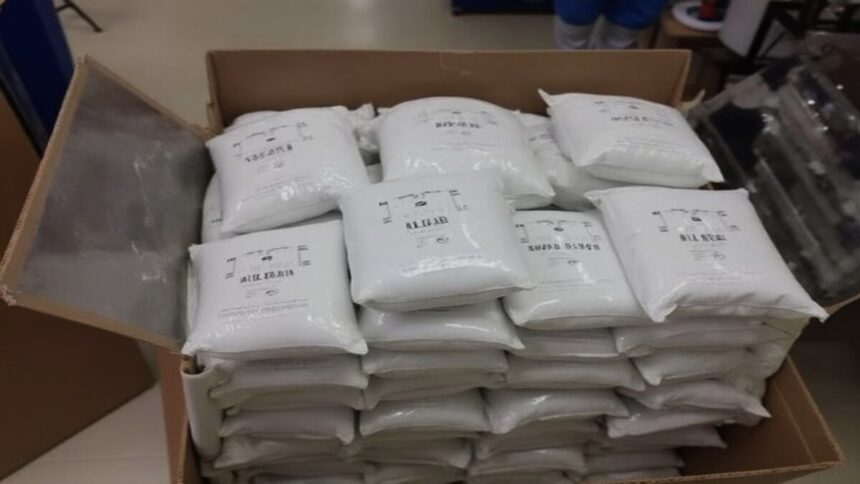In a significant crackdown on drug trafficking, the Delhi Police have seized approximately 200 kilograms of cocaine valued at a staggering ₹2,000 crore from a warehouse in the Ramesh Nagar area of West Delhi. This operation marks the second major drug bust in the capital within just a week, reflecting the ongoing battle against drug-related crimes in the city.
The Latest Seizure
The Delhi Police declared on Thursday, October 10, that 200 kg of cocaine had been found during a raid in Ramesh Nagar. The police discovered the drugs hidden in a closed shop, with authorities estimating that the cocaine’s worth could reach ₹2,000 crore in the international market. This seizure comes shortly after another major operation in which the police confiscated 560 kilograms of cocaine and 40 kilograms of hydroponic marijuana, valued at approximately ₹5,620 crore. Both incidents indicate a disturbing trend of escalating drug trafficking activities in Delhi.
Connection to Previous Busts
The police believe that the recent cocaine seizure is linked to the earlier bust of 560 kilograms of cocaine. Officials have suggested that both operations may be connected to the same drug syndicate, hinting at a larger network involved in the transportation and distribution of illegal drugs across the region. The authorities are currently investigating the extent of this syndicate’s operations and its possible connections to international drug trafficking.
Cocaine worth more than 2000 crores recovered by Delhi Police in Delhi 🔥🔥
— desi mojito 🇮🇳 (@desimojito) October 10, 2024
Last week Congress wale kingpin ki 5500 crore ki pakdi gayi thi 💀💀
pic.twitter.com/ODi2Ugejwi
The Mechanism of the Bust
In the most recent operation, the Delhi Police’s Special Cell employed advanced technology to track the vehicle suspected of transporting the drugs. By using GPS tracking, they were able to pinpoint the location of the warehouse in Ramesh Nagar where the cocaine was stored. This innovative approach underscores the police’s commitment to combating drug trafficking and ensuring that those involved in such activities are brought to justice.
Implications of the Drug Busts
Concerns concerning the rising incidence of drug trafficking in the nation’s capital have been highlighted by the spate of drug busts in Delhi. The sheer scale of the recent seizures highlights the urgent need for law enforcement agencies to intensify their efforts in tackling this issue. With organized crime syndicates operating in the shadows, it is imperative that police continue to enhance their capabilities to disrupt these networks and prevent drugs from entering the streets.
Political Fallout and Additional Issues
A political dispute between the Lieutenant Governor’s office and the Aam Aadmi Party (AAP) has surfaced amid the drug busts. Chief Minister Atishi was “forcibly vacated” from the Civil Lines apartment, which Arvind Kejriwal had occupied, according to the Chief Minister’s Office (CMO). The CMO claims that the Bharatiya Janata Party (BJP) was the driving force behind this action, and that Lieutenant Governor V. K. Saxena had the intention of giving the house to a member of the saffron party.
The Controversy Explained
The AAP has asserted that Atishi followed all the necessary procedures before moving into the bungalow, while the Public Works Department (PWD)—which is under Atishi’s jurisdiction—argues that an official handover of the property from Kejriwal to the department has yet to occur. The ongoing situation has escalated tensions between the AAP and the Lieutenant Governor’s office, further complicating the political landscape in Delhi.
The Bigger Picture
The dual challenges of drug trafficking and political discord present a complex scenario for Delhi’s law enforcement and government officials. As the police continue to make significant drug busts, the need for a coordinated and comprehensive approach to tackle both issues becomes increasingly vital.
The Road Ahead
Going forward, it is essential for the authorities to not only address the immediate concerns surrounding drug trafficking but also to ensure that political conflicts do not impede efforts to maintain law and order. Strengthening collaboration between various law enforcement agencies and government bodies could play a crucial role in dismantling drug syndicates and addressing the underlying issues contributing to the proliferation of drugs in Delhi.
The recent massive drug bust in Delhi serves as a stark reminder of the ongoing battle against drug trafficking and organized crime. With the seizure of 200 kilograms of cocaine and previous large-scale operations, it is clear that the fight is far from over. As the Delhi Police work diligently to apprehend those responsible and dismantle the networks behind these operations, the community must remain vigilant and supportive of efforts aimed at creating a safer environment for all. The unfolding political drama adds another layer of complexity, emphasizing the need for unity and cooperation in addressing the challenges faced by the capital.
Read More: Hizb-Ut-Tahrir Declared a Terrorist Organization by Indian Government
